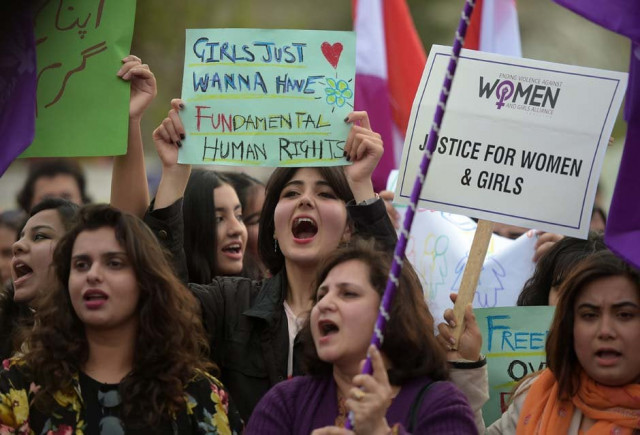Women are human too
Women in urban and privileged sections in Pakistan suffer in a more subtle, yet prevalent ways

Women in urban and privileged sections in Pakistan suffer in a more subtle, yet prevalent ways. PHOTO: FILE
History depicts dehumanisation of particular racial and religious groups via language. During the Holocaust, Nazis considered Jews as Untermenschen meaning ‘subhuman’. Also the Serbs referred to the Bosnian Muslims as ‘aliens’. Dehumanisation is rampant across gender too. William Brennan in his article ‘Female object of Semantic dehumanization and violence’ writes, “The parade of horrors have been virtually endless: the killing of female infants, enforced prostitution, the burning of women accused of witchcraft, widow burning, the reduction of women to sex objects through genital mutilation, the sale of enslaved females, wife battering, the exploitation of young women as pornographic models, rape, father-daughter incest, and other types of sexual abuse. The scope, ferocity, and persistence of oppression against women is a grim testimony of man’s relentless inhumanity towards the female members of the human race. The victimisation has not ended yet; women continue to be abused, exploited, and assaulted on a massive scale in today’s society.”
Global estimates published by the WHO indicated that about one in three (35%) women experience physical or sexual violence in lifetime, and that 38% of the murders of women are committed by male intimate partners. In Pakistan, there are cultural institutions, beliefs and practices that undermine women’s autonomy and contribute to gender-based violence. As per the statistics from various researches, 93% of all women in the country have suffered sexual harassment in public places, while 70% have experienced physical or sexual violence. Every second woman in Pakistan suffers from some form of domestic abuse. In addition, 77% of all women in the country face verbal abuse either at home or at the workplace.
Marriage is another practice through which women are objectified and dehumanised, especially with customs such as dowry, bride’s price, Watta Satta and marriage to the Quran. Extreme cases of homicide or ‘stove burns’ can provide husbands with an opportunity to pursue another marriage and consequently more dowry.
A common expression of dehumanisation is objectification which we see in the practice of regarding women as equivalent to merchandise for disposal in the marketplace. The traditional dispute-resolution structure of the Jirga system is an example where women are offered as compensation to settle the dispute. Similarly, women are being sold into marriages in the tribal system for cash or kind.
Women in urban and privileged sections in Pakistan suffer in a more subtle, yet prevalent ways. Mental health issues are common due to physical as well as mental abuse such as invalidation, oppression, dominance and control by men. The lack of empathy, routine dismissal of not just women’s feelings and needs but robbing her of her human qualities and treating her as an object leave an educated woman feeling depressed, beaten-down and worthless.
Like Charles M Blow said, “One doesn’t have to operate with great malice to do great harm. The absence of empathy and understanding are sufficient.” Despite the presence of numerous bodies, violence against women in its varied forms needs utmost of the attention of the government as a matter no less important than economic or political affairs.
Published in The Express Tribune, April 7th, 2019.
Like Opinion & Editorial on Facebook, follow @ETOpEd on Twitter to receive all updates on all our daily pieces.















COMMENTS
Comments are moderated and generally will be posted if they are on-topic and not abusive.
For more information, please see our Comments FAQ